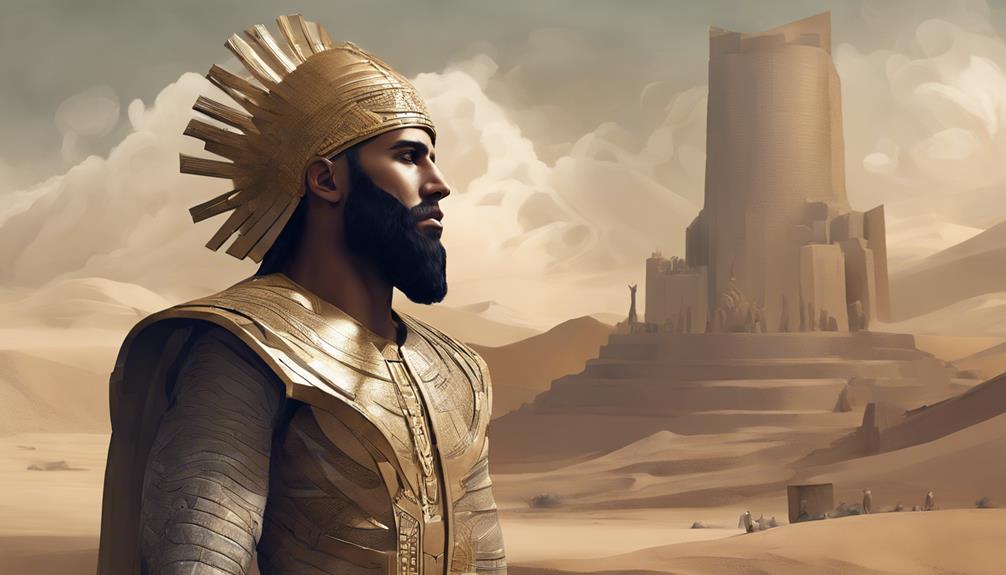Summary
- 1 The origins of Nebuchadnezzar
- 2 Meaning and Biblical References
- 3 Cultural impact and legacy
- 4 Interpretations in different contexts
- 5 Modern perceptions and popular culture
- 6 Frequently asked questions
- 6.1 What is the etymology of the name Nebuchadnezzar?
- 6.2 Was Nebuchadnezzar's reign marked by any significant achievement?
- 6.3 How did Nebuchadnezzar's reign affect neighboring civilizations?
- 6.4 Are there disputed historical accounts of Nebuchadnezzar?
- 6.5 Did Nebuchadnezzar have any important successors or descendants?
Discover the multifaceted significance of Nebuchadnezzar, an ancient ruler synonymous with power and grandeur. His legacy weaves military conquests with architectural marvels and biblical tales of humility and redemption. From his father's overthrow of the Assyrian Empire to his own reign that expanded Babylonian territory, Nebuchadnezzar's name resonates throughout history as a symbol of power and complexity. Delve into his varied cultural impact, from representations in ancient texts to modern pop culture references, showing both admiration and fascination for this enigmatic figure. Discover the various meanings behind Nebuchadnezzar's name and immerse yourself in his fascinating story.
The origins of Nebuchadnezzar

If you have ever been curious about Nebuchadnezzar's origins, let's explore his fascinating background. Nebuchadnezzar II, the most famous king of Babylon, reigned from 605 to 562 B.C. He was known for his military conquests, including the destruction of Jerusalem and the construction of the Hanging Gardens of Babylon, one of the Seven Wonders of the Ancient World.
Born in the Chaldean dynasty, Nebuchadnezzar's father, Nebopolassar, was a nobleman who overthrew the Assyrian Empire and founded the Neo-Babylonian Empire. Nebuchadnezzar came to the throne after his father's death and quickly proved himself a formidable ruler. His military campaigns expanded the empire's borders, consolidating the rule of Babylon In the region.
Nebuchadnezzar's legacy went beyond his military mastery. He was a patron of the arts and architecture, commissioning impressive structures that showcased Babylon's wealth and power. Despite his successes, Nebuchadnezzar's reign was not without controversy, as his treatment of the conquered peoples and his actions toward the Kingdom of Judah aroused both admiration and condemnation.
Meaning and Biblical References
Let us now discover the meaning and biblical references surrounding the Nebuchadnezzar, highlighting its role in ancient texts and religious narratives. In the Bible, particularly in the Book of Daniel, Nebuchadnezzar is depicted as the powerful and ambitious king of Babylon. He is famous for his conquests, including thesiege of Jerusalem and the destruction of the Temple of Solomon. Nebuchadnezzar's story takes a significant turn when he has a series of dreams vivid interpreted by the prophet Daniel, showing his vulnerability and his ultimate recognition of God's power.
One of the most renowned stories involving Nebuchadnezzar is his period of madness, in which he is humbled by God and lives among wild animals. This period serves as a lesson in humility and the consequences of pride. Despite his initial arrogance, Nebuchadnezzar eventually recognizes God's greatness and his kingdom is restored. These biblical narratives paint a complex picture of Nebuchadnezzar, illustrating themes of power, humility, and divine intervention.
Cultural impact and legacy

Investigating the cultural impact and lasting legacy of Nebuchadnezzar reveals a multifaceted influence that extends beyond ancient history to modern interpretations and artistic representations.
- Architectural Wonders: Nebuchadnezzar's construction projects, such as the Hanging Gardens of Babylon, are lauded as wonders of the ancient world, inspiring wonder and admiration for his architectural prowess.
- Literary References: The character of Nebuchadnezzar appears in various literary texts, from ancient texts such as the Bible to modern novels and poems, showing his enduring presence in literature.
- Artistic Representations: Artists of all ages have captured Nebuchadnezzar's image in paintings, sculptures and even films, visually perpetuating his legacy for contemporary audiences.
- Symbol of Power: Nebuchadnezzar's reign symbolizes the pinnacle of Babylonian power and influence, serving as a historical reference point for understanding ancient civilizations and their rulers.
Interpretations in different contexts
Investigating how Nebuchadnezzar is interpreted in different contexts offers a nuanced understanding of his historical importance and cultural impact. In biblical contexts, Nebuchadnezzar is often portrayed as a powerful and proud king who faced divine punishment for his arrogance, as described in the Book of Daniel. In Mesopotamian historical records, he is considered an important ruler who expanded the Babylonian Empire and built impressive architectural wonders such as the Hanging Gardens of Babylon. In modern academic interpretations, Nebuchadnezzar is studied for his military achievements, administrative innovations and influence on later empires. The different representations of Nebuchadnezzar in these contexts highlight the multifaceted nature of his legacy and the complexities of historical interpretation. By examining these different perspectives, a deeper understanding can be gained of Nebuchadnezzar's role in shaping ancient history and his lasting impact on cultural narratives.
Modern perceptions and popular culture

Modern perceptions and pop culture have transformed Nebuchadnezzar from a historical figure into a symbol of power and extravagance. Today, Nebuchadnezzar is often mentioned in various forms of media, from movies to music, depicting him as an over-the-top character who embodies opulence and authority.
- Film: Nebuchadnezzar is often depicted in films as a ruthless king who rules vast empires with a grand and commanding presence.
- Music: In music, Nebuchadnezzar's name is used metaphorically to symbolize wealth and dominance, especially in genres such as rap and hip-hop.
- Fashion: High fashion brands sometimes draw inspiration from the time of Nebuchadnezzar, incorporating elements of Babylonian culture into their designs to convey a sense of luxury and power.
- Social Media: Memes and viral content often play on Nebuchadnezzar's image, humorously associating him with excess and exaggerated lifestyle in a light-hearted way.
Frequently asked questions
What is the etymology of the name Nebuchadnezzar?
So when reflecting on the name Nebuchadnezzar, it is fascinating to delve into its etymology. This name is of Akkadian origin and has considerable historical and biblical significance. It is composed of several elements that convey meanings related to the power of the Babylonian king and to the god Marduk. Understanding the roots of this name can provide perspectives on the cultural and religious context of ancient Mesopotamia.
Was Nebuchadnezzar's reign marked by any significant achievement?
Yes, Nebuchadnezzar's reign was marked by significant successes. He expanded the Babylonian Empire, built the Hanging Gardens of Babylon (one of the Seven Wonders of the Ancient World) and built imposing fortifications such as the Gate of Ishtar. Nebuchadnezzar's reign also saw advances in architecture, astronomy and mathematics. His military achievements and cultural contributions solidified his legacy as a powerful and influential ruler in ancient history.
How did Nebuchadnezzar's reign affect neighboring civilizations?
When Nebuchadnezzar reigned, neighboring civilizations felt the weight of Babylon's power. Its kingdom influenced them through conquest, tribute demands, and cultural influence. Babylon's military might and administrative advances redefined the region. Trade routes flourished, but vassal states faced strict control. The Hanging Gardens of Babylon, one of the Seven Wonders of the Ancient World, displayed the grandeur of Nebuchadnezzar, leaving a lasting impression on neighboring lands.
Are there disputed historical accounts of Nebuchadnezzar?
Yes, there are various historical disputes concerning Nebuchadnezzar. Different sources often provide conflicting information about specific events or aspects of his reign, leading to scholarly debates and interpretations. These disputes may concern his military campaigns, building projects, or even personal attributes. It is crucial to examine different perspectives and critically evaluate the evidence to develop a thorough understanding of Nebuchadnezzar's historical legacy.
Did Nebuchadnezzar have any important successors or descendants?
Thus, after Nebuchadnezzar's reign, there were a number of prominent successors and descendants who played key roles in Babylonian history. His son, Amel-Marduk, reigned briefly after him, followed by a series of rulers, including Neriglissar and Labashi-Marduk. Nebuchadnezzar's legacy influenced the political landscape for years to come, with his descendants continuing to shape Babylonian history.
